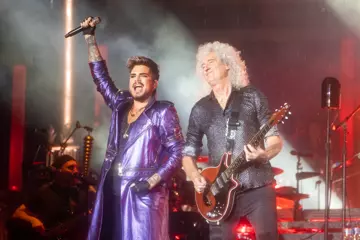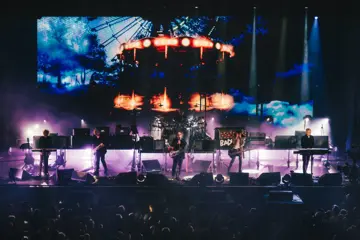 ICEHOUSE
ICEHOUSEWithout a doubt, Icehouse were one of the great Australian musical success stories of the '80s, the band dropping their debut album Icehouse in 1980 (when they were still called Flowers, before changing their moniker to avoid conflict with a similarly-named Scottish outfit) and then racking up the hits throughout the course of the entire decade. The brainchild of songwriter and frontman Iva Davies, their raft of singles such as Can't Help Myself, We Can Get Together, Love In Motion, Great Southern Land, Hey Little Girl, Crazy, Electric Blue, My Obsession and Nothing Too Serious – seriously just the tip of the Icehouse iceberg – made them a household name in Australia and gained them major traction globally, even if that success did start to drift away for them once the calendar ticked over into the '90s.
Last year Davies pulled a version of the ever-fluid Icehouse line-up together for a run of well-received reunion shows, and now they're taking the whole thing a step further, re-releasing the entire Icehouse catalogue with special emphasis on two of their most successful albums which celebrate simultaneous milestones in 2012 – sophomore long-player Primitive Man (1982) turns 30 and career pinnacle Man Of Colours (1987) turns 25 – and hitting the road for the aptly-named Primitive Colours tour.
“I famously never, ever listen to albums once they're finished,” a relaxed Iva Davies chuckles. “You put such a lot of effort into recording and mixing and it all seems to go on forever, and then once you've come up with a tracklist you sit down and you listen to it – in those days you'd have to listen to test pressings to make sure that there weren't any clicks or pops – and by then you've put such a lot of work into it that I would never, ever listen to them again. Now I'm forced to do that, because later in the year we're touring with a focus on Primitive Man and Man Of Colours, so I've been forced to go back and study them and kind of pull them apart, which has been interesting.”
Even though Icehouse had already enjoyed considerable success prior to Primitive Man, Davies recalls that, for all intents and purposes, the album began as a solo project. “The process of Primitive Man was quite accidental on a number of levels,” he remembers. “The first album had been developed by a live band over a number of years, so they were all highly road-tested songs, and by the time we came to record them they'd been though a number of versions. It was a great success, and we went off on our first international tour and we went all over America and were pretty well exhausted when we came back.
Don't miss a beat with our FREE daily newsletter
“I was still pretty unsure about how to write songs, and I had in front of me this prospect of producing a follow-up album to this huge album. That was daunting, but while I was in America I'd picked up a couple of pieces of technology that I'd brought back to Australia: one was a brand new invention called the Linn drum, which was a very effective prototype of a drum machine which sounded like a drummer – before then they'd been funny little electronic beat boxes – and the other thing was the first affordable home eight-track recording system. That allowed me to go into my bedroom and start producing things that sounded like rough finished recordings, and that was how I approached the task of trying to write the next set of songs.
“The next thing I knew, it was suggested that the producer [Keith Forsey] from America would come out to Australia, and I'd go into a studio here and basically repeat the demos, which is what I did. [It] was basically me in a studio by myself, so of course what that produced was a completely different style, and a set of songs which were complete studio constructs – quite different to the four-piece band.”
Given its ad hoc genesis and reliance on electronic sounds, Primitive Man has dated very well, especially compared to other albums from the time. “Even at that time we'd been though a number of years of synthesisers, and by the time we got into the very early-'80s I was starting to hear things that I knew wouldn't date very well,” Davies continues. “There were certain sounds that I thought were more quirky and idiosyncratic than anything else, and I scrupulously avoided sounds like that. To me it's funny background decisions like that which may have saved some of these recordings from dating in a more spectacular way.”
Then five years later came the smash hit Man Of Colours, a seeming success on every level and their highest-charting album all over the globe. “I think a lot of things came together. On the previous album Measure For Measure (1986) we'd worked incredibly hard, it was an expensive album and we'd gone over to record it in England and then toured every pit stop in Australia before embarking on a long and arduous tour of America, and it had a measure of success – a number of American Top 50 singles – without really breaking through,” Davies recalls. “But I firmly believe that the work that we put into the previous album really kind of set the stage for Man Of Colours, and really it was just up to writing a decent set of songs, which turned out to be better than decent.
“I was surprised by its reception. In fact I was absolutely gob-smacked by what happened in Australia – it was number one for eleven weeks, and we'd never even had a number one album before. And then Electric Blue was a number one single, and that was the only one that we've ever had. So when it started taking off in America, I remember getting a call from our manager who said, 'Crazy has just hit the Top 20 in America!' and I was completely numbed by the shock of it.”
Does Davies think it's strange how albums seem to be dying off as a format, even as they're still embraced by older generations looking back as with these two classics? “It is and it isn't,” he mulls. “I put a great deal of it down to the technology that my children's generation have – at their age I'd saved painfully for about three LPs and that was all I could afford, but they can have access to tens of thousands of songs, and as a result they're going back in time and cherry-picking through the ages. It doesn't surprise me now when my eighteen-year-old daughter comes to me and says, 'I've just discovered Janis Joplin', or maybe The Who or The Rolling Stones, or whoever - I think with the access they have to material, it's not surprising at all that they're not embracing the album as a form.”
















